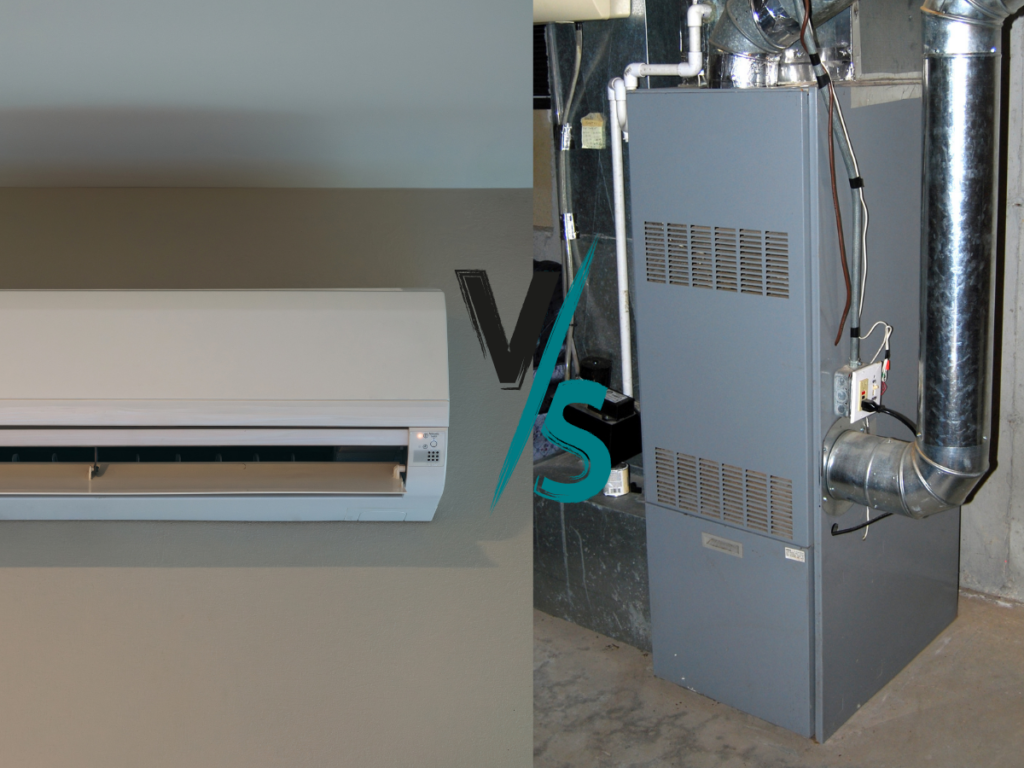
Replacing your home’s heating system can be frustrating, but it’s also an exciting opportunity to improve your home. A new heating system will make your home safer, more comfortable, and more energy efficient—if you choose the right one.
In this post, we break down the pros and cons of two of the most popular types of heating systems in Massachusetts, gas furnaces and heat pumps, to help you decide which is the best choice for your home.
What Is a Heat Pump & How Does it Work?
An air-source heat pump is a type of home heating and cooling system that works by transferring heat. In the winter, it extracts heat from the air outside and releases it into your home. In the summer, it works in reverse, absorbing heat from the air inside your home and releasing it outside. Because it can both heat and cool, a heat pump can effectively replace both a furnace and an air conditioner, which is a big advantage.
What Is a Gas Furnace & How Does it Work?
A gas furnace is a type of heating system that works by using combustion to burn natural gas, generating heat. This is called combustion heating. Combustion heating is reliable, but it has several drawbacks. Gas furnaces burn fossil fuels, which is not good for the environment. They can also release toxic emissions into the air if they’re not vented properly, which is a health and safety concern. But, gas is more affordable than electricity in Massachusetts. For most households, a gas furnace will be more affordable to operate than an electric heat pump.
Heat Pumps vs Gas Furnaces: Key Differences
Installation Costs & Incentives
The upfront costs of both furnaces and heat pumps vary widely based on factors like home size, existing gas lines, existing HVAC ductwork, and more. That said, it typically costs less to install a gas furnace than it does to install a heat pump. However, heat pumps are eligible for significant rebates and incentives that gas furnaces don’t qualify for. You can save up to $10,000 when you install a heat pump in Massachusetts with Mass Save® rebates. (If you meet income requirements, you may qualify for additional rebates, up to $16,000—find out if you’re eligible for income-based offers.) You may also be eligible for 0% interest financing, up to $50,000 for heat pump installation. These incentives significantly reduce the upfront cost of a heat pump and, in many cases, make them more affordable than gas furnaces.
Energy Efficiency
When it comes to heat pump vs gas furnace efficiency, heat pumps have the edge. They can transfer more heat than the electricity they consume, often achieving over 300% efficiency. By contrast, high-efficiency gas furnaces typically reach about 95-98% efficiency, making a heat pump the more energy efficient option.
But what about in cold climates? Heat pump efficiency drops as outside temperatures fall, and many Massachusetts homeowners worry that a heat pump is no match for a New England winter. This was a concern in the past, but modern cold-climate heat pumps are built for the cold. They maintain their efficiency in temperatures well below freezing. There’s also the option to install a dual-fuel system, which combines a heat pump and a gas furnace. The system then uses the most efficient option based on the outdoor temperature.
Operating Costs
Operating costs (and your subsequent heating bills) are determined by fuel costs. In Massachusetts, natural gas is cheaper than electricity, which means gas furnaces are more affordable to run than electric heat pumps. If you’re switching from a gas furnace to a heat pump, your utility bills will increase.
Health & Safety
When it comes to health and safety, heat pumps are generally considered safer than gas furnaces. Since they don’t store or burn fuel inside your home, heat pumps don’t produce combustion-related emissions, reducing the risk of indoor air pollution and carbon monoxide poisoning. Gas furnaces, on the other hand, require proper venting and regular maintenance to prevent leaks and ventilation issues that can lead to hazardous indoor air quality.
Versatility
One of the main advantages of a heat pump is its versatility—it can both heat and cool your home, whereas a furnace only provides heat. This dual functionality makes a heat pump an all-in-one system, eliminating the need for a separate air conditioning unit.
Additionally, heat pumps are available in ducted and ductless models, making them more adaptable. Ducted heat pumps connect to existing ductwork and are an easy choice for homes with a central air duct system. For homes without ducts or with older, inefficient ductwork, ductless mini split heat pumps are an effective solution. These systems work without ducts, eliminating the need for extensive air duct installation or repair.
Environmental Impact
Heat pumps are a more environmentally friendly option than a gas furnace. Since they run on electricity, heat pumps don’t directly burn fossil fuel, reducing their carbon footprint compared to gas furnaces, which do burn fuel. This is especially impactful if you currently have or plan to install solar panels. With solar, you can power a heat pump using 100% renewable energy, significantly reducing your impact on the environment.
The Bottom Line: Is a Heat Pump Better than a Furnace?
For many homeowners, a heat pump can replace a gas furnace, providing year-round comfort with impressive energy efficiency. But heat pumps and furnaces both offer their own benefits and drawbacks, and the choice between them will depend on your specific needs and circumstances. Neeeco can help you decide which heating system makes the most sense for your home during a no-cost Mass Save Home Energy Assessment. During this no-cost assessment, we’ll evaluate your home’s overall energy efficiency and recommend the best upgrades for improving it. We’ll also walk you through the Mass Save rebates and incentives you qualify for and help you take full advantage of these generous savings.
*Some restrictions apply. Offers are subject to change or cancellation. Visit MassSave.com/HEA for full details.
